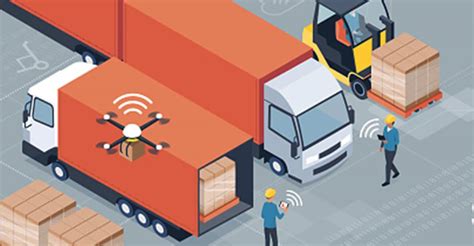Logistics Problem

The field of logistics is a complex and ever-evolving discipline, encompassing the efficient management of resources and processes to ensure smooth operations. From optimizing supply chains to enhancing delivery systems, logistics professionals are constantly seeking innovative solutions to overcome challenges and drive success. In this comprehensive article, we delve into the world of logistics, exploring its intricacies, key challenges, and the strategies employed to tackle them.
Understanding Logistics: Definition and Scope

Logistics, often considered the backbone of modern businesses, involves the meticulous planning and execution of a wide range of activities. These activities are geared towards efficiently managing the flow of goods, information, and resources between the point of origin and the point of consumption. The scope of logistics extends beyond mere transportation, encompassing a holistic approach to supply chain management.
In today's dynamic business landscape, logistics plays a pivotal role in determining the success and competitiveness of organizations. With global markets expanding and customer expectations soaring, logistics professionals face the daunting task of ensuring seamless operations while maintaining high levels of efficiency and customer satisfaction. This article aims to unravel the complexities of logistics, offering insights into the strategies and innovations shaping the industry.
Key Challenges in Logistics Operations

The logistics industry is riddled with a myriad of challenges, each posing unique obstacles to efficient operations. From managing intricate supply chains to navigating complex regulatory frameworks, logistics professionals must possess a multifaceted skill set to navigate these hurdles.
Supply Chain Complexity
The modern supply chain is a labyrinth of interconnected processes, involving multiple stakeholders and touchpoints. From raw material procurement to final delivery, each step in the supply chain introduces its own set of challenges. Logistics professionals must juggle diverse factors such as lead times, inventory management, and transportation costs to ensure a seamless flow of goods.
To illustrate, consider the case of a global electronics manufacturer. The company's supply chain spans multiple countries, with raw materials sourced from various regions. Logistics managers must navigate the complexities of international trade, manage customs procedures, and ensure timely delivery of components to manufacturing facilities. Any disruption in this intricate network can lead to costly delays and impact the company's ability to meet customer demands.
Last-Mile Delivery Challenges
The last mile of the delivery process, often the most critical, presents a unique set of challenges. This phase, involving the final leg of the journey from a transportation hub to the customer’s doorstep, requires meticulous planning and execution. Logistics professionals must navigate congested urban areas, manage unpredictable traffic conditions, and ensure timely and secure deliveries.
For instance, e-commerce giants like Amazon and Alibaba face significant last-mile delivery challenges, especially in densely populated urban areas. With millions of packages being delivered daily, logistics managers must employ innovative strategies such as crowdshipping and drone delivery to optimize efficiency and reduce costs. Additionally, ensuring customer satisfaction through real-time tracking and flexible delivery options is paramount in this highly competitive industry.
Regulatory and Compliance Issues
Logistics operations are subject to a myriad of regulatory frameworks and compliance requirements. From safety regulations to environmental standards, logistics professionals must stay abreast of evolving laws and guidelines to ensure legal compliance. Non-compliance can result in hefty fines, legal repercussions, and damage to the company’s reputation.
Take the example of a logistics company specializing in hazardous material transportation. The company must adhere to stringent regulations governing the safe handling, storage, and transportation of hazardous goods. From obtaining the necessary permits to implementing safety protocols, logistics managers play a crucial role in ensuring compliance and mitigating risks associated with hazardous materials.
Strategies for Overcoming Logistics Challenges
To tackle the myriad of challenges in logistics, professionals employ a range of strategies and innovations. These strategies are geared towards optimizing processes, enhancing efficiency, and ensuring a seamless flow of goods and resources.
Supply Chain Optimization
Optimizing the supply chain is a cornerstone of effective logistics management. By leveraging advanced technologies and analytics, logistics professionals can identify inefficiencies and implement strategic improvements. This involves analyzing data to optimize inventory levels, streamline transportation routes, and enhance collaboration between supply chain partners.
For instance, the adoption of radio-frequency identification (RFID) technology has revolutionized supply chain management. RFID tags, attached to products or pallets, enable real-time tracking and visibility throughout the supply chain. Logistics managers can monitor inventory levels, track shipments, and identify potential bottlenecks, allowing for timely interventions and improved supply chain performance.
Last-Mile Delivery Innovations
To overcome the challenges of last-mile delivery, logistics professionals are embracing innovative solutions. These include crowdshipping, where deliveries are made by a network of independent couriers, and drone delivery, utilizing unmanned aerial vehicles to deliver packages. Additionally, the use of smart lockers and automated delivery systems is gaining traction, offering convenient and secure delivery options to customers.
A notable example of last-mile delivery innovation is the implementation of electric cargo bikes by major retailers. These bikes, equipped with insulated compartments, enable efficient and eco-friendly deliveries in urban areas. By leveraging this technology, logistics managers can reduce delivery times, minimize environmental impact, and enhance customer satisfaction.
Compliance and Risk Management
Ensuring compliance with regulatory frameworks is a critical aspect of logistics operations. Logistics professionals employ a range of strategies to mitigate risks and ensure legal compliance. This includes implementing robust training programs, conducting regular audits, and staying abreast of evolving regulations.
Furthermore, the adoption of technology plays a pivotal role in compliance and risk management. Logistics companies are increasingly leveraging blockchain technology to enhance transparency and traceability in supply chains. By recording transactions and tracking goods on a distributed ledger, logistics managers can ensure compliance, reduce fraud, and mitigate risks associated with supply chain disruptions.
The Future of Logistics: Trends and Innovations
The logistics industry is on the cusp of significant transformation, driven by technological advancements and changing market dynamics. As businesses strive to meet the evolving demands of customers, logistics professionals are embracing innovative solutions to enhance efficiency and competitiveness.
Adoption of Advanced Technologies
The integration of advanced technologies is revolutionizing logistics operations. From artificial intelligence and machine learning to the Internet of Things (IoT), these technologies are enabling logistics professionals to make data-driven decisions and optimize processes.
For instance, the use of AI-powered analytics is enhancing demand forecasting, allowing logistics managers to optimize inventory levels and reduce waste. Additionally, the IoT is transforming supply chain visibility, with connected sensors and devices providing real-time data on the location and condition of goods throughout the supply chain.
Sustainable Logistics Practices
With growing concerns over environmental sustainability, logistics companies are embracing eco-friendly practices. This includes the adoption of electric vehicles, optimized routing to reduce carbon emissions, and the use of sustainable packaging materials. Logistics professionals are also exploring the potential of renewable energy sources to power warehouses and distribution centers.
A notable example of sustainable logistics practices is the implementation of a circular supply chain model. This model focuses on minimizing waste and maximizing resource efficiency by promoting the reuse and recycling of materials. Logistics managers are working closely with suppliers and customers to develop closed-loop systems, reducing the environmental impact of logistics operations.
Enhanced Customer Experience
In today’s customer-centric business landscape, logistics professionals are prioritizing the enhancement of the customer experience. This involves offering real-time tracking, flexible delivery options, and personalized services to meet the evolving expectations of customers.
For instance, the use of augmented reality (AR) is transforming the delivery experience. Logistics companies are leveraging AR to provide customers with a virtual preview of their deliveries, allowing them to visualize the products and make informed decisions. Additionally, the integration of chatbots and voice assistants is enhancing customer support, providing instant responses to inquiries and resolving issues in real-time.
Conclusion: Navigating the Logistics Landscape

The logistics industry is a dynamic and complex ecosystem, constantly evolving to meet the challenges of a globalized and digital world. Logistics professionals, armed with innovative strategies and a deep understanding of supply chain dynamics, are driving success and competitiveness in their organizations.
From optimizing supply chains to embracing sustainable practices, logistics professionals are at the forefront of innovation. As the industry continues to transform, the focus on data-driven decision-making, technological integration, and customer-centric approaches will shape the future of logistics. By navigating the complexities of logistics, professionals can ensure efficient operations, meet customer expectations, and drive business growth.
How can logistics professionals stay updated with industry trends and innovations?
+Logistics professionals can stay abreast of industry trends by actively participating in industry conferences, webinars, and workshops. Additionally, subscribing to reputable industry publications and following thought leaders on social media platforms can provide valuable insights and updates on emerging technologies and best practices.
What are the key benefits of optimizing the supply chain through technology?
+Optimizing the supply chain through technology offers several benefits, including improved visibility and traceability, enhanced collaboration between supply chain partners, and reduced costs through efficient inventory management and transportation optimization.
How can logistics companies ensure compliance with regulatory frameworks?
+Logistics companies can ensure compliance by implementing robust compliance programs, conducting regular audits, and staying informed about evolving regulations. Additionally, the adoption of technology, such as blockchain, can enhance transparency and traceability, reducing the risk of non-compliance.



